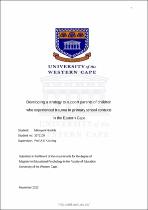| dc.description.abstract | Trauma is identified as “the state of severe fright or shock that a person experiences when confronted with a sudden, unexpected, potentially life-threatening event over which the person does not have control and to which the persons are unable to respond effectively” (Dye, 2015, p.158). In South Africa, many children are exposed to traumatic events. Children therefore need support to deal with trauma. Past studies have shown that traumatised children in some contexts might get support from psychologists, psychiatrists and other health professional specialists. In other contexts, the child might only have the support of a parent. In view of the fact that schools are well positioned to refer children who have experienced trauma, the role of schools in assisting parents to support their children seems imperative. The research literature on trauma-informed schools emphasises the important role that schools should play in supporting children who have experienced trauma. However, there is still a gap in the knowledge on the role that schools can play in guiding parents to effectively support children who have experienced trauma. The aim of this study was to investigate what a school-based strategy can do to equip parents and caregivers in resource-restrained contexts to support children who have experienced trauma. A transformative paradigm guided the design of the study. A participatory action research approach was applied in combination with a basic qualitative research design to ensure that the research was con-ducted with and for people rather than on people. The research was conducted in two semi-urban primary schools in the O.R. Tambo Inland District in the Eastern Cape, South Africa. The participants included parents, School-Based Support Team members (SBST), School Governing Body (SGB) members as well as health professionals who provide support to children who experience trauma. The data were gathered through a cyclic process that included individual interviews with ten selected parents, two focus group interviews with SBST and SGB members, health professionals, and community members from the local community. Thematic analysis was conducted. The findings of the study contributes to the knowledge on the implementation of the Screening, Identification, Assessment and Support Policy (2014) and strengthen the capacity of resource- constrained schools to enhance care and support for children who experience trauma by providing guidelines for engagement with the parents of these children | en_US |

